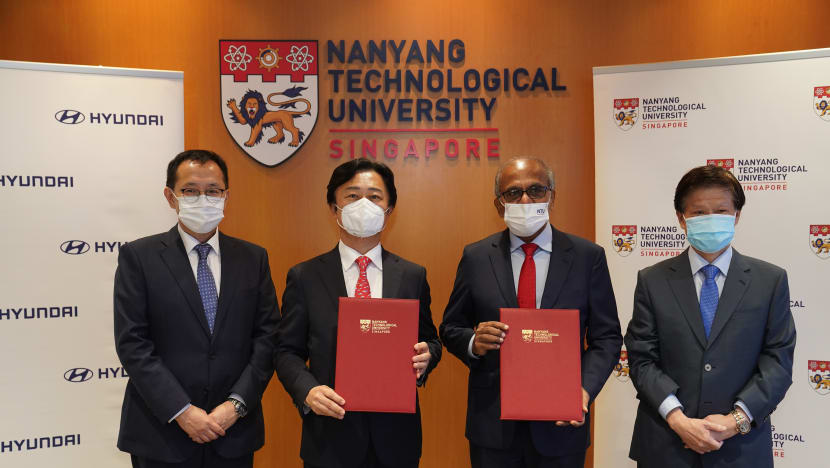China3D printingNet, September 6, as countries try to address climate change by increasing the production of electric vehicles (EV), manufacturers are exploring opportunities to fully advance their operations by deploying new manufacturing technologies. Among them is Hyundai Motor Group, which is cooperating with Singapore’s Nanyang Technological University (NTU Singapore) to explore the use of “Industry 4.0” technologies such as artificial intelligence (AI) and 3D printing in the manufacture of electric vehicles.
With the great help of Nanda, Singapore, this city-state has become an exciting center for additive manufacturing (AM). South Korean companies such as Hyundai have gone to this tropical island to promote the use of this technology in their own applications. In October 2020, the car company held a virtual groundbreaking ceremony for Singapore’s Hyundai Motor Group Innovation Center (HMGICS). Nanda has become the first academic research partner of the HMGICS program.

(LR) Hong Bum Jung, Senior Vice President of Hyundai Motor Group, Chi Yingchao, President and Chief Innovation Officer of Hyundai Motor Group, Professor Subra Suresh, President of NTU, and Professor Lam Khin Yong, Senior Vice President (Research) of NTU attended the signing ceremony September 2021 Held at Nanda on the 1st. Image courtesy of Nanda, Singapore.
Hyundai hopes to cooperate with Singapore’s Nantah University to establish “the most advanced factory in the future” starting with four pilot projects dedicated to artificial intelligence and additive manufacturing (AM) starting in September this year. One project will develop machine learning for vehicle image processing, in which artificial intelligence-driven image processing sensors are used to detect defects and abnormalities in the production of battery-powered electric vehicles. The other will see how 3D printing can be integrated into electric vehicle manufacturing, such as the customization of auto parts and overall smart factory operations. In the future, Hyundai hopes that customers will order vehicles that suit their own style.

Rendering of the innovation center of Singapore’s Hyundai Motor Group. Image courtesy of Hyundai.
When signing the cooperation agreement, Professor Subra Suresh, President of NTU said: “The partnership between NTU and Hyundai Motor Group once again provides an example of how our close cooperation with the industry is developing relevant solutions. Play an important role in solving real-world problems. This is in line with Nanda’s 2025 strategic plan, which aims to solve some of the major challenges facing mankind. This cooperation with Hyundai Motor Group will rely on Nanda’s expertise in additive manufacturing, artificial intelligence, autonomous driving and Core strengths in the fields of electric vehicles and big data will bring benefits to the automotive industry, Singapore and the global society.”
Chi Yingchao, President and Chief Innovation Officer of Hyundai Motor Group, said: “HMGICS aims to build an ecosystem for the future mobile industry based on open innovation. We will strengthen cooperation with Nantah University and develop advanced solutions to completely change the future. Mobile value chain.”
HMGICS is scheduled to be completed by the end of 2022 and is only a 5-minute drive from the Nanda Smart Campus. The partnership will witness future cooperation, aiming to train new talents for the automotive industry. This includes a 3D printing competition dedicated to the use of new technologies in automotive engineering, thereby motivating students to become interested in electric vehicle production and look forward to the future of transportation.At the same time, the competition will show3D printingAdvantages in the production of electric vehicles. Other benefits will include joint educational seminars between Hyundai and NTU professors.
Like all automakers, Hyundai has been using 3D printing for some time, but in the past decade, the company’s efforts have become more serious, partly because the South Korean government has made more serious investments. In 2017, this meant the opening of a new design studio in its R&D center in Nanyang, aiming to cut the product design cycle in half. Subsequently, Hyundai Mobis, its parts and service division, took similar measures in 2018.

2021 IONIQ Electric hatchback. Image courtesy of Hyundai.
Since 2014, Hyundai, together with Volkswagen, Volvo, Renault, Jeep, Citroen and Fiat, were found to be cheating emission tests, the brand has begun to emphasize sustainability through the IONIQ electric vehicle department. With IONIQ, the company hopes to sell 1 million electric vehicles per year by 2025. As it achieves this goal, we can expect Hyundai to turn more to technologies such as artificial intelligence and 3D printing. Perhaps with the actions of Volkswagen and Ford, by 2025, we will see metal adhesive jet parts finally appearing in mass-produced electric vehicles.
China3D printingNet compile article!
(Editor in charge: admin)


0 Comments for “Hyundai Motor will promote electric vehicle manufacturing through 3D printing”